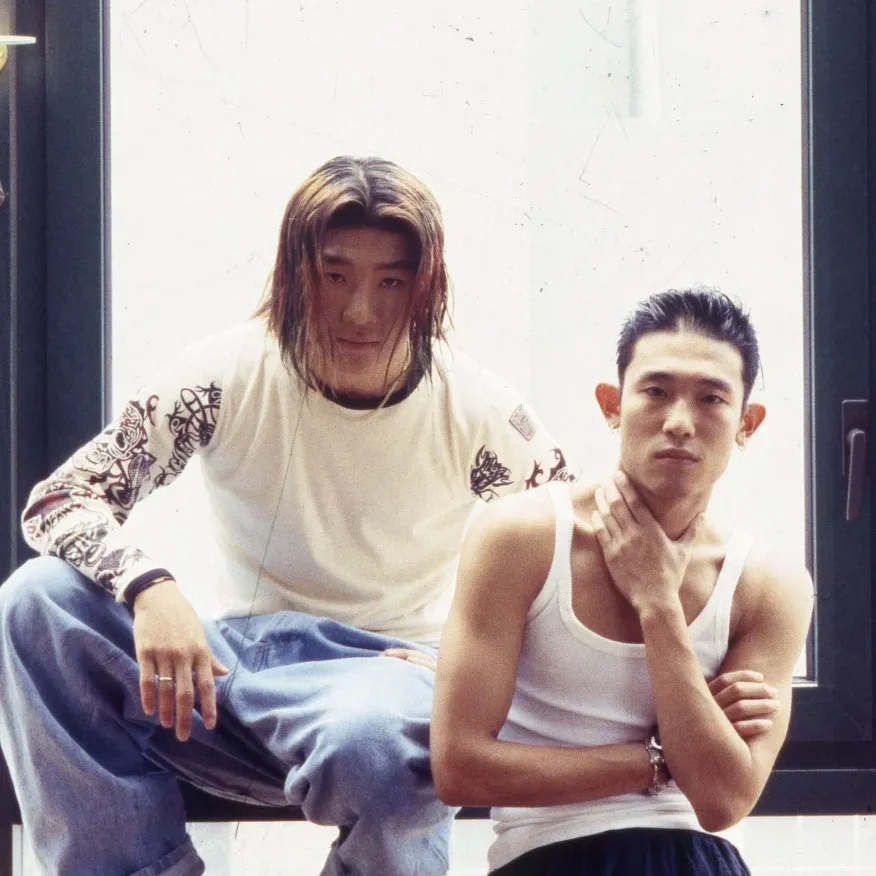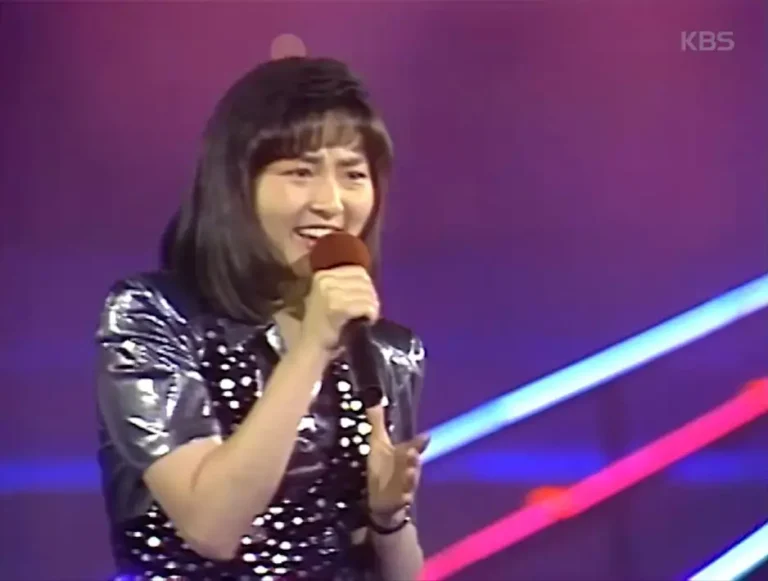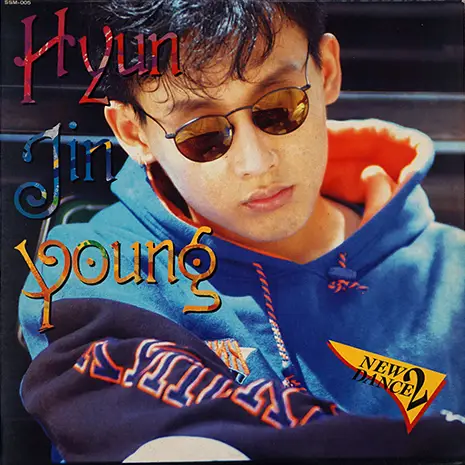
Introduction
In the early 1990s, as South Korea’s music scene was undergoing a dramatic transformation, a duo emerged that would forever change the landscape of K-pop. DEUX, composed of Lee Hyun Do and Kim Sung Jae, was not only a musical act but a cultural phenomenon. Their influence on music, dance, fashion, and the very structure of K-pop is profound, and their legacy continues to shape the genre today. This essay explores the history, artistry, cultural impact, and enduring legacy of DEUX, providing an in-depth look at one of K-pop’s most influential and innovative groups.
Origins and Formation
Lee Hyun Do and Kim Sung Jae first crossed paths as backup dancers for Hyun Jin Young, a pioneering Korean rapper under SM Entertainment. The dance crew, known as Wawa, was a breeding ground for future stars, and it was here that Lee and Kim honed their skills in both performance and music production. Lee Hyun Do, influenced by his time in Southern California, brought with him a deep appreciation for hip-hop, while Kim Sung Jae contributed a flair for choreography and visual style. Their partnership was built on mutual respect and a shared vision: to introduce authentic hip-hop and new jack swing to the Korean mainstream.
In 1993, the duo officially debuted as DEUX with their self-titled album. This marked the beginning of a brief but explosive career that would leave an indelible mark on Korean popular music.
Musical Style and Innovation
DEUX’s sound was revolutionary for its time. Drawing inspiration from American hip-hop and new jack swing, they fused these genres with Korean melodic sensibilities, creating a sound that was both fresh and accessible. Their debut album featured the hit “Turn Around and Look at Me,” a track that showcased their signature blend of rap, R&B, and dance beats. The use of drum machines, breakbeats, and syncopated rhythms set them apart from their contemporaries, many of whom were still rooted in traditional ballads or early pop.
Lee Hyun Do took on the role of primary producer, crafting tracks that were rich in groove and rhythm. Kim Sung Jae, meanwhile, was responsible for choreography and stage presentation, ensuring that their performances were as visually compelling as they were musically innovative. Together, they brought a level of professionalism and artistry that was rare in the Korean music industry at the time.
Discography and Major Works
DEUX released four studio albums during their active years: “Deux” (1993), “Deuxism” (1994), “Rhythm Light Beat Black” (1994), and “Force Deux” (1995). Each album marked a progression in their sound and artistic maturity.
- Deux (1993): The debut album introduced listeners to the duo’s unique style. “Turn Around and Look at Me” became an instant classic, while tracks like “I Knew” and “My Stupid Story” demonstrated their range and versatility.
- Deuxism (1994): This sophomore effort featured the hit “We Are,” which topped music charts for five consecutive weeks. The album sold over 300,000 copies within a month and a half of its release, a remarkable feat at the time. “We Are” became an anthem for a generation, blending catchy hooks with socially conscious lyrics.
- Rhythm Light Beat Black (1994): This album included remixes of earlier hits alongside new material, further cementing their reputation for innovation. Songs like “Weak Man” and “Eternal Song” showcased their ability to evolve while staying true to their roots.
- Force Deux (1995): Their final album before disbandment, “Force Deux” pushed the boundaries of their sound, incorporating elements of funk, jazz, and hardcore hip-hop. Tracks such as “Break Off the Yoke” and “After Arguing” reflected a more mature and introspective approach.
In addition to studio albums, DEUX released live recordings and greatest hits compilations, ensuring that their music continued to reach new audiences even after their disbandment.
Cultural Impact and Fashion
DEUX’s influence extended far beyond music. They were fashion trailblazers, popularizing hip-hop-inspired streetwear in Korea. Their signature look—baggy pants, oversized shirts, bandanas, and sportswear—became the template for countless acts that followed. This embrace of American urban fashion was not mere imitation; DEUX added a distinctly Korean twist, making the style their own and inspiring a generation of fans to do the same.
Their choreography was equally groundbreaking. Kim Sung Jae’s routines were energetic, precise, and innovative, incorporating elements of breakdancing and popping that had rarely been seen on Korean stages. The duo’s performances set new standards for stagecraft, influencing the highly synchronized dance routines that are now a hallmark of K-pop.
Influence on K-pop and Korean Hip-Hop
DEUX is often credited as one of the first acts to fully dedicate themselves to hip-hop in Korea. While other artists dabbled in rap or incorporated Western influences, DEUX made hip-hop the core of their identity. They introduced Korean audiences to rap verses, English-Korean rhyming, and the concept of “rap dance”—a fusion of vocal melodies, rap, and dance beats. This blueprint would become the foundation of modern K-pop, paving the way for groups like H.O.T., Sechs Kies, and eventually, global superstars like BTS.
Their impact on Korean hip-hop is equally significant. By demonstrating that rap could be both commercially viable and artistically credible, DEUX inspired a new generation of artists to explore the genre. Their willingness to address social issues in their lyrics, combined with their commitment to authenticity, helped legitimize hip-hop as a form of expression in Korea.
The Tragic End and Lasting Legacy
In 1995, at the height of their popularity, DEUX disbanded to pursue solo careers. Tragedy struck almost immediately. Kim Sung Jae, having just released his solo debut, was found dead under mysterious circumstances. The official cause was listed as a drug overdose, but subsequent investigations revealed traces of animal anesthesia in his system. Suspicion fell on his girlfriend, who was initially convicted of his murder but later acquitted on appeal. The case remains one of Korea’s most enduring mysteries, casting a shadow over the group’s legacy.
Lee Hyun Do continued his career as a producer and composer, working with some of K-pop’s biggest names and appearing on popular music shows. He released a greatest hits album, “Deux Forever,” in memory of his late partner, ensuring that DEUX’s music would not be forgotten.
Recognition and Awards
During their brief career, DEUX received numerous accolades. They won the SCK Popularity Award at the Golden Disc Awards and topped music charts with hits like “We Are” and “Break Off the Yoke.” In 2004, they were posthumously honored with the Mnet PD’s Choice Award, a testament to their enduring influence.
Enduring Influence in Contemporary K-pop
DEUX’s legacy is evident in every aspect of modern K-pop. The genre’s emphasis on performance, fashion, and multimedia storytelling can be traced directly to the standards set by DEUX. Their willingness to innovate, to blend genres, and to challenge conventions set a precedent that continues to drive the industry forward.
Contemporary artists and producers frequently cite DEUX as an inspiration. Their music is sampled, covered, and referenced by new generations of idols and rappers. The duo’s commitment to authenticity and artistic integrity remains a guiding light for those seeking to push the boundaries of K-pop.
Conclusion
DEUX’s story is one of innovation, artistry, and tragedy. In just a few short years, Lee Hyun Do and Kim Sung Jae transformed Korean popular music, introducing hip-hop and new jack swing to a mainstream audience and setting the stage for the global phenomenon that K-pop would become. Their influence on music, fashion, dance, and culture is immeasurable, and their legacy continues to inspire artists and fans alike.
Though their time together was brief, the impact of DEUX endures. As pioneers of a new sound and vision, they helped define what K-pop could be, and their music remains as fresh and vital today as it was more than thirty years ago. The story of DEUX is not just a chapter in the history of K-pop—it is one of its foundational pillars, a testament to the power of creativity, collaboration, and the enduring spirit of innovation.



